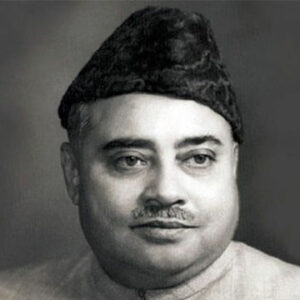Khawaja Nazimuddin was born in Dhaka, and he is known as one of the most important politicians in East Bengal and Pakistan’s history. Even though he was from the noble Nawab family of East Bengal, this famous leader was seen by many as the most humble person in the world. He went to good schools in India and England, so he had a mix of Indian and Western values. People still look up to this man because he was honest, had a gentle personality, and worked hard for the good of the country. Before and after Pakistan was made, this outstanding politician held a number of high-level positions. Before India and Pakistan split up, he was the “Education Minister” and “Chief Minister” of Bengal. He also led the “Muslim League” for many years. During his time in office, he made many changes that were very good for India’s Muslim population. Later, when Pakistan broke away from India, he became the Governor-general of Pakistan and then became the Prime Minister of that country. During his time, this well-known national leader was a strong political figure, but his strict ways didn’t always make him popular with the general public. As a tribute, Pakistan has named districts and roads after this passionate leader.
Early years and childhood
Khawaja Nazimuddin was born on July 19, 1894, in Dhaka, which is now Bangladesh. His parents, Khwaja Nizamuddin and Nawabzadi BilkeesBano were from the East Bengal Nawab family.
He went to the “Dunstable Grammar School” in Bedfordshire, England, for elementary school. The young man then went to higher education at the “Aligarh Muslim University” in Uttar Pradesh and the “Trinity Hall” college of the “University of Cambridge” in England.
Khawaja Nazimuddin’s Career
In 1922, he became the Chairman of the “Dhaka Municipality” and also worked on the “Executive Council” of “Dhaka University.” This was the start of his political career.
From 1922 to 1929, he served three terms as a “Member of Bengal Legislative Assembly” for the Barisal Muslim constituency.
Sir Khawaja was given the job of “Education Minister” of Bengal in 1929. In the same year, he joined the “Governor’s Executive Council” as a member. As the “Education Minister,” this politician passed the “Compulsory Primary Education Bill.” This bill was meant to make Hindus and Muslims the same educational opportunities.
In 1934, Nazimuddin was named “Minister of Agriculture.” In this role, he introduced major reforms like the “Agriculture Debtors Bill” and the “Bengal Rural Development Bill,” which were meant to stop Hindu zamindars from oppressing Muslim peasants.
Khawaja reorganized the “Muslim League” in Bengal in 1935. It was made up of all Muslim political parties except FazlulHaq’s “KrishakPraja Party.” Two years later, in the general elections in Bengal’s Patuakhali constituency, the first candidate lost to Haq, but he won in North Calcutta.
In 1937, this well-known leader joined Haq’s Coalition Ministry as the Home Minister, a job he held for four years. Sir Khawaja quit his job when he found out that he and Haq had different ideas. He was a supporter of Pakistani leader Jinnah.
In 1943, this hard-working politician was named the Chief Minister of Bengal, and he quickly took steps to deal with a famine in the area. He was also the head of the “Muslim League” at the same time.
In 1945, Nazimuddin’s cabinet of ministers had to resign, and his friend Suhrawardi took over as the head of government.
When Pakistan was made two years later, this leader was put in charge of the state of East Bengal in the new country.
When Jinnah died in 1948, Khawaja took over as Governor-general of Pakistan.
The next year, the national leader from Dhaka, at the suggestion of Pakistan’s first Prime Minister, Liaquat Ali Khan, set up the “Basic Principles Committee” to talk about the country’s constitutional principles.
Sir Khawaja took over as the leader of Pakistan after Liaquat in 1951. He was also a member of the “Constituent Assembly” and the head of the “Muslim League.”
On April 17, 1953, Nazimuddin lost his job as Prime Minister because the economy was bad, the government wasn’t doing a good job, and there was tension between the Punjabi and Bengali people. Governor-general Ghulam Mohammad kicked out the prime minister and gave Mohammad Ali Bogra the power to form a new government.
Works of note
Sir Khawaja will always be remembered as one of the most dedicated Prime Ministers of Pakistan, even though his time in office was cut short. Even now, people think that taking him out of office hurt democracy in the country.
Honors and Accomplishments
In 1926, Nazimuddin was given the rank of “Companion of the Order of the Indian Empire,” which was created by Queen Victoria to honor bravery.
In 1934, King George V made him a “Knight Commander of the Order of the Indian Empire.”
Personal History and Legacies
In 1924, Khawaja Nazimuddin married Shah Bano, who was the daughter of Khawaja Ashraf.
He died on October 22, 1964, and was buried next to the graves of FazlulHaq and Suhrawardi, two national leaders of Bangladesh, in the “SuhrawardiUdyan” on the grounds of the Dhaka High Court.
The Karachi suburbs of Nazimabad and North Nazimabad are named after this well-known leader. In his honor, roads are named after him in Dhaka, the capital of Bangladesh, and Islamabad, the capital of Pakistan.
Pakistan Post, which is the country’s main mail service, made a stamp to honor Nazimuddin.
Estimated Net worth
Khawaja is one of the most popular and wealthiest politicians. Based on what we found on Wikipedia, Forbes, and Business Insider, Khawaja Nazimuddin has a net worth of about $1.5 million.
Trivia
This former Prime Minister of Pakistan was made a knight by the British Empire. In 1946, he gave up his knighthood to show his support for India’s fight for independence.


